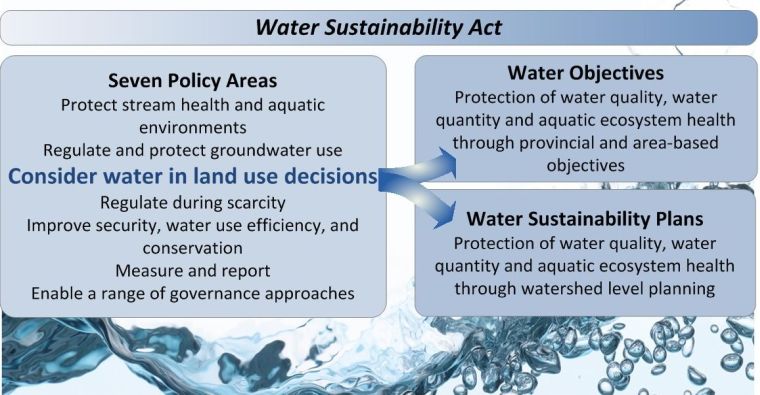Report on Water Sustainability and the City (Dec 2017): “B.C.’s new Water Sustainability Act could increase local governments’ abilities to more sustainably manage local watersheds,” says report author Chistine Mettler, Canadian Freshwater Alliance
Note to Reader:
Although local governments in British Columbia can influence a number of activities that impact watershed health in their jurisdictions, many face challenges in addressing watershed pressures. At the Nanaimo Water Symposium in April 2018, Christine Mettler of the Freshwater Alliance will report on research conducted with dozens of urban watershed practitioners across B.C., outlining environmental and management challenges and how new tools developed under B.C.’s new Water Sustainability Act could help to address some of these challenges.
Download a copy of the latest version of the PROGRAM BROCHURE
To register, visit https://www.civicinfo.bc.ca/event/2018/Nanaimo-Water-Symposium

Insights on Urban Watersheds Management in B.C.
“Urban waters are instrumental in supporting a number of environmental, social, economic, cultural and human health functions. But they are among the most degraded watersheds,” reports Christine Mettler, Communications and Special Projects Lead with the Canadian Freshwater Alliance, and author of Water Sustainability and the City: Leveraging BC’s Water Sustainability Act in Support of Urban Watershed Management.
 “Local governments in British Columbia have the ability to influence a number of activities that impact watershed degradation in their jurisdictions. However, many practitioners are concerned about the health of urban watersheds and report challenges to addressing the pressures that negatively impact these waters.
“Local governments in British Columbia have the ability to influence a number of activities that impact watershed degradation in their jurisdictions. However, many practitioners are concerned about the health of urban watersheds and report challenges to addressing the pressures that negatively impact these waters.
“This report describes some of these challenges, and suggests how new tools developed under B.C.’s new Water Sustainability Act could help to address some of these challenges.”
Overview of Findings
The report synthesizes empirical data gathered from surveys, interviews, and workshops with practitioners that work for and with local government in cities on Vancouver Island, the Lower Mainland, the Kamloops area, and the Okanagan.
“Over three-quarters of British Columbia’s population live in urbanized watersheds,” continues Christine Mettler. “These watersheds are a cornerstone of ecological and human health as well as economic and social activity. Important as they are, urban waters are threatened.
“Concerns about water quality, low flows and flooding, and habitat loss are increasingly common in many cities around B.C. Local governments play a large role when it comes to protecting watershed health. However, many watershed professionals working in local government feel stymied in their efforts to protect their local watersheds.
“Even though local government have powers to affect how land is developed in their jurisdiction, participants identified land-use change as a salient challenge: 83 per cent of participants said this was a ‘significant’ or ‘very significant’ problem (four and five out of five in severity).”
The Key Takeaway
“Despite existing tools, there are challenges, but there’s also an opportunity to seize regulatory and policy development under the WSA to address those challenges and develop innovative ways of working together for positive change. So the report recommends a number of areas that local governments can advocate for more support to the province,” emphasizes Christine Mettler.”
To Learn More:
To read the report, download a copy of Water Sustainability and the City: Leveraging BC’s Water Sustainability Act in Support of Urban Watershed Management
To read the highlights, download the Executive Summary.

Photo: Mill Creek flood in Kelowna. Photo Credit: Christine Mettler.
About the Water Sustainability Act
The Water Sustainability Act addresses seven policy areas. These policy areas bring together 19 of the 45 Living Water Smart commitments that are ultimately implemented through the Act, build on the current merits of the Water Act and bring in new policy tools which will help manage BC’s water more sustainably into the future.
One policy area – consider water in land use decisions – helps to address the potential impacts of land use actions on water. To do this, the Water Sustainability Act enables a number of tools which will help decision makers better manage the impacts of land use on water.
The development of Water Objectives and Water Sustainability Plans are two tools for managing the impacts of land use on water.
Integration with Local Government Planning
The Water Sustainability Act also allows for the development of Water Sustainability Plans. These collaboratively developed plans can integrate water and land use planning and can be combined with other local, regional or provincial planning processes to address water-related issues focused on addressing or preventing conflict, mitigating risk to water quality, water quantity and aquatic ecosystem health or restoring watershed function.
“ The scale and scope of each plan – and the process used to develop it – would be unique, and would reflect the needs and interests of the watersheds affected. Planning will be an effective tool where the need is great, and where other area-based management tools are not able to address the links between land use and watershed impacts,” explains Jennifer Vigano, Water Policy, BC Ministry of Environment. Jennifer helped to write the new Act.
The scale and scope of each plan – and the process used to develop it – would be unique, and would reflect the needs and interests of the watersheds affected. Planning will be an effective tool where the need is great, and where other area-based management tools are not able to address the links between land use and watershed impacts,” explains Jennifer Vigano, Water Policy, BC Ministry of Environment. Jennifer helped to write the new Act.
To Learn More:


